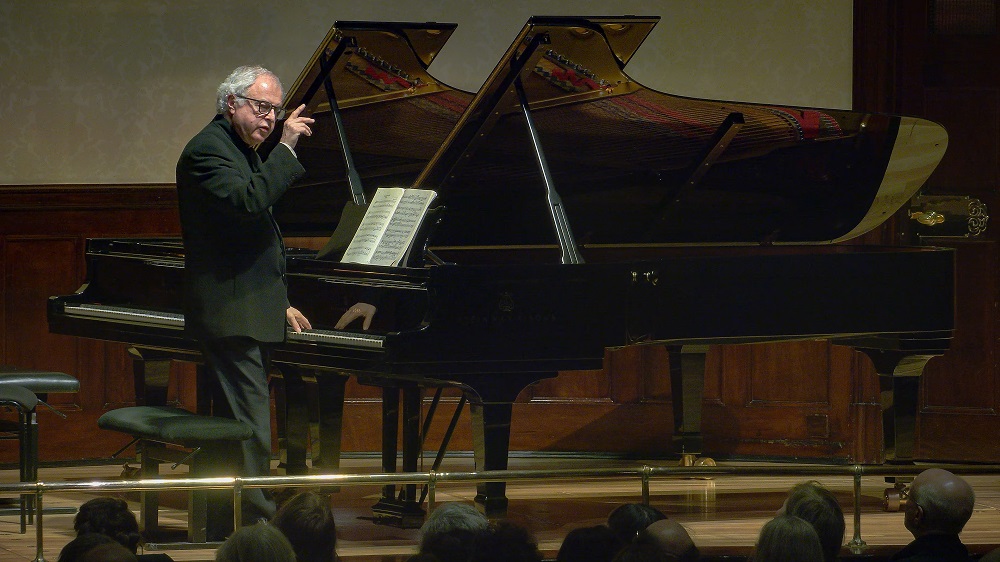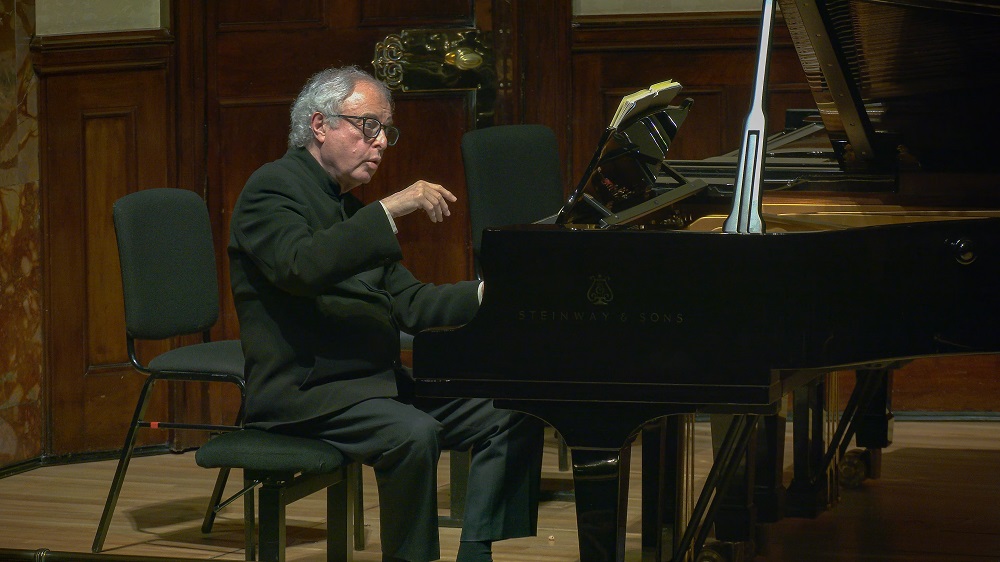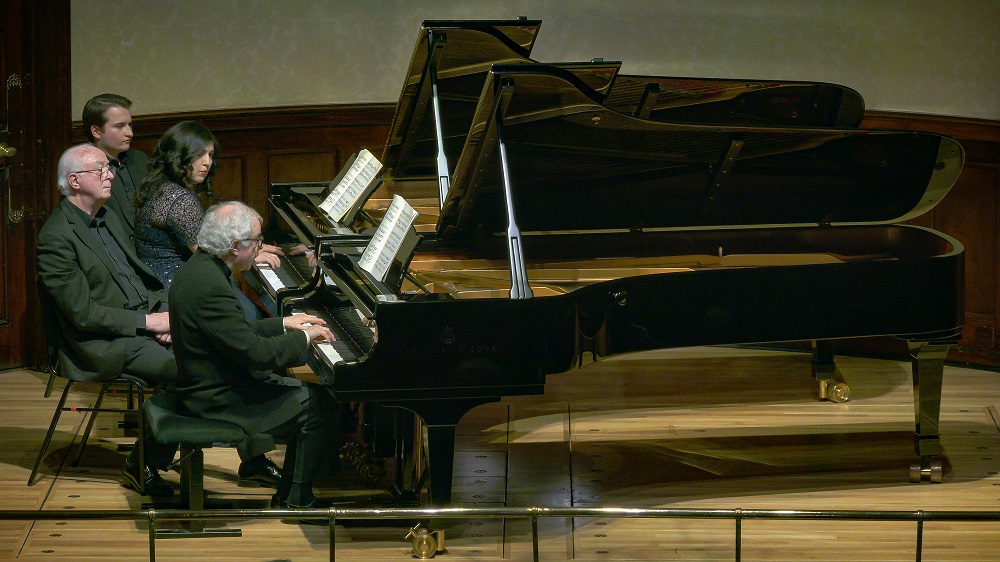The Art of Fugue, Schiff, Nosrati, Wigmore Hall review - rarity and quality in music and performance | reviews, news & interviews
The Art of Fugue, Schiff, Nosrati, Wigmore Hall review - rarity and quality in music and performance
The Art of Fugue, Schiff, Nosrati, Wigmore Hall review - rarity and quality in music and performance
Technical hitches over, the great pianist turns from speech to song

At the start of his 75-minute pre-concert lecture on Sunday, the incomparable András Schiff staked quite a claim for the piece he was about to perform: Bach’s The Art of Fugue was, he said: “the greatest work by the greatest composer who ever lived”.
And a wise one: this concert was only the second time he would ever play it, the first having been in Berlin last January. Because, he said: “I’ve waited 70 years to play this work… You cannot climb Mount Everest immediately… this is the climax.”
He continued with a poetic clarity akin to that of the piece itself. On the fact that it is unfinished: he cited the note by CPE Bach that “at this point [during Contrapunctus 14] the composer died”. And disdain for those who would feign "finish" it, with a reference to Michelangelo’s Prigioneri in Florence: “Who in their sane mind would think to come with a hammer and chisel and start banging away at Michelangelo’s marble?”  Then things went wrong.
Then things went wrong.
Schiff had already cocked a jocular snook at “technology” by saying that full programme notes were available on the Wigmore Hall’s “website”, though he himself had no idea how to access that, and praised Bach’s handwriting – “who writes letters any more?” Then his microphone attached to a headpiece started making awful feedback noises, breaking the spell. Schiff ploughed on, but eventually removed it, to continue without amplification.
Scurrying staff provided another mike, hand-held, but it too began to screech. Schiff tried yet another: “I had not intended this to become a comedy show,” he offered gallantly – it was excruciating. He cast the mike aside, then the other, to speak unaided, for all the soft sonority of his voice. But even from the floor, the microphones squealed and whined. Usually elegant Schiff picked them up in turn, threw and smashed them into the corners – kaput. “This technology is a disaster,” he spat, uncharacteristically for such a musical shaman, in half-amused, dismissive rage, referring, it seemed, not just to this shabbiness, but the whole damned thing.
For a venue of this repute to insult and potentially humiliate a star of Schiff’s renown with its own ineptitude is unforgivable. As a result, those paying for better seats could hear Bach’s mysteries eloquently unlocked with illuminating sagacity – others with difficulty, if at all. Worse, Schiff was left alone to cope and dispose of these wretched machines as he did; clueless staff seemed not to care, and the chaos was then aggravated by streams of latecomers allowed in to find their seats while Schiff bravely prepared us for the wonderment to follow.
Which he did, and which it was, so that even this offensive mediocrity failed to spoil the night: which belonged to Bach, and to probably the greatest living exponent of his music, ready at last, by his own exacting standards, to give this masterpiece of ingenuity, complexity and lucidity entwined. Humble before his master, Bach, Schiff becomes a master too.  The opening "group" of four Contrapuncti establishes simplicity made complex, but also vice-versa – the infinite possibilities of a primary melodic idea. The second group opens with a stretta in Contrapunctus 5, followed by the stilo francese variations of Contrapunctus 6. The diminutions and augmentations of Contrapunctus 7 began to haunt the space of the hall: “it's difficult to follow,” Schiff had said of these, “but believe me, it’s all there.”
The opening "group" of four Contrapuncti establishes simplicity made complex, but also vice-versa – the infinite possibilities of a primary melodic idea. The second group opens with a stretta in Contrapunctus 5, followed by the stilo francese variations of Contrapunctus 6. The diminutions and augmentations of Contrapunctus 7 began to haunt the space of the hall: “it's difficult to follow,” Schiff had said of these, “but believe me, it’s all there.”
The third group starts with Contrapunctus 8, intricate and complex, while Contrapunctus 9 affirms this aqueous quality to Schiff’s Bach, like a waterfall, river’s current or tide that ebbs and flows, ever-changing, but a continuum.
The intricate mathematics – fugal subjects and their counterpoints, the "rectus" and "inversus" sections; questions and answers, in a way – are also mystical. If there is one piece to illustrate Pythagoras’ notion of music as the sound of "celestial spheres", it is this.
So the overall sense is one of trance, a hypnosis that enchants. This is "scientific" music, Schiff says, “in part to fulfil a pedagogical function” reads the programme. But it is also "Santus", in its way.
For all the mathematical perfection, Schiff loves and plays cantabile, so that melodies sing out; “The piano is not a percussion instrument,” he had said.  And so to the last group, where, in Contrapunctus 13, “to play this and the inversion, you need a third hand,” joked Schiff. Bach accordingly wrote versions of the rectus and inversus of this section for two pianos, for which Schiff was joined by Schaghajegh Nosrati (pictured above).
And so to the last group, where, in Contrapunctus 13, “to play this and the inversion, you need a third hand,” joked Schiff. Bach accordingly wrote versions of the rectus and inversus of this section for two pianos, for which Schiff was joined by Schaghajegh Nosrati (pictured above).
Then to Contrapunctus 14, with its steps towards whatever lies beyond this life, or so it felt by now. Fourteen is an important number in Bach, said Schiff, with significances in the Partitas and elsewhere. Bach’s non-finale is charged with a return to simplicity, reaching the subject that spells his name: Bb-A-C-B# (BACH) – which then vanishes into thin air – one of the most remarkable moments in music. Schiff kept his head low, to achieve as long a meditative silence as possible.
It takes a lot to get this entire audience on its feet, but this was inevitable tonight: for the rarity and quality of the music and its playing, and for Schiff’s overcoming the initial ordeal to do so.
rating
Explore topics
Share this article
Add comment
The future of Arts Journalism
You can stop theartsdesk.com closing!
We urgently need financing to survive. Our fundraising drive has thus far raised £49,000 but we need to reach £100,000 or we will be forced to close. Please contribute here: https://gofund.me/c3f6033d
And if you can forward this information to anyone who might assist, we’d be grateful.

Subscribe to theartsdesk.com
Thank you for continuing to read our work on theartsdesk.com. For unlimited access to every article in its entirety, including our archive of more than 15,000 pieces, we're asking for £5 per month or £40 per year. We feel it's a very good deal, and hope you do too.
To take a subscription now simply click here.
And if you're looking for that extra gift for a friend or family member, why not treat them to a theartsdesk.com gift subscription?
more Classical music
 Appl, Levickis, Wigmore Hall review - fun to the fore in cabaret and show songs
A relaxed evening of light-hearted fare, with the accordion offering unusual colours
Appl, Levickis, Wigmore Hall review - fun to the fore in cabaret and show songs
A relaxed evening of light-hearted fare, with the accordion offering unusual colours
 Lammermuir Festival 2025, Part 2 review - from the soaringly sublime to the zoologically ridiculous
Bigger than ever, and the quality remains astonishingly high
Lammermuir Festival 2025, Part 2 review - from the soaringly sublime to the zoologically ridiculous
Bigger than ever, and the quality remains astonishingly high
 BBC Proms: Ehnes, Sinfonia of London, Wilson review - aspects of love
Sensuous Ravel, and bittersweet Bernstein, on an amorous evening
BBC Proms: Ehnes, Sinfonia of London, Wilson review - aspects of love
Sensuous Ravel, and bittersweet Bernstein, on an amorous evening
 Presteigne Festival 2025 review - new music is centre stage in the Welsh Marches
Music by 30 living composers, with Eleanor Alberga topping the bill
Presteigne Festival 2025 review - new music is centre stage in the Welsh Marches
Music by 30 living composers, with Eleanor Alberga topping the bill
 Lammermuir Festival 2025 review - music with soul from the heart of East Lothian
Baroque splendour, and chamber-ensemble drama, amid history-haunted lands
Lammermuir Festival 2025 review - music with soul from the heart of East Lothian
Baroque splendour, and chamber-ensemble drama, amid history-haunted lands
 BBC Proms: Steinbacher, RPO, Petrenko / Sternath, BBCSO, Oramo review - double-bill mixed bag
Young pianist shines in Grieg but Bliss’s portentous cantata disappoints
BBC Proms: Steinbacher, RPO, Petrenko / Sternath, BBCSO, Oramo review - double-bill mixed bag
Young pianist shines in Grieg but Bliss’s portentous cantata disappoints
 theartsdesk at the Lahti Sibelius Festival - early epics by the Finnish master in context
Finnish heroes meet their Austro-German counterparts in breathtaking interpretations
theartsdesk at the Lahti Sibelius Festival - early epics by the Finnish master in context
Finnish heroes meet their Austro-German counterparts in breathtaking interpretations
 Classical CDs: Sleigh rides, pancakes and cigars
Two big boxes, plus new music for brass and a pair of clarinet concertos
Classical CDs: Sleigh rides, pancakes and cigars
Two big boxes, plus new music for brass and a pair of clarinet concertos
 Waley-Cohen, Manchester Camerata, Pether, Whitworth Art Gallery, Manchester review - premiere of no ordinary violin concerto
Images of maternal care inspired by Hepworth and played in a gallery setting
Waley-Cohen, Manchester Camerata, Pether, Whitworth Art Gallery, Manchester review - premiere of no ordinary violin concerto
Images of maternal care inspired by Hepworth and played in a gallery setting
 BBC Proms: Barruk, Norwegian Chamber Orchestra, Kuusisto review - vague incantations, precise laments
First-half mix of Sámi songs and string things falters, but Shostakovich scours the soul
BBC Proms: Barruk, Norwegian Chamber Orchestra, Kuusisto review - vague incantations, precise laments
First-half mix of Sámi songs and string things falters, but Shostakovich scours the soul
 BBC Proms: Alexander’s Feast, Irish Baroque Orchestra, Whelan review - rapturous Handel fills the space
Pure joy, with a touch of introspection, from a great ensemble and three superb soloists
BBC Proms: Alexander’s Feast, Irish Baroque Orchestra, Whelan review - rapturous Handel fills the space
Pure joy, with a touch of introspection, from a great ensemble and three superb soloists
 BBC Proms: Moore, LSO, Bancroft review - the freshness of morning wind and brass
English concert band music...and an outlier
BBC Proms: Moore, LSO, Bancroft review - the freshness of morning wind and brass
English concert band music...and an outlier

Comments
Great, well-written review -
Great, well-written review - to compensate those unable to attend.
Thank you for this important
Thank you for this important review. Schiff said many times that he didn't know whether he would ever be capable of playing this great work. Am immensely happy for him that he achieved this lifetime ambition, but also sad that the Wigmore seems to have been unprofessional.
Schiff, the Master, a great
Schiff, the Master, a great human, a great musicien, devoted to Music. He links music with spirituality.
Under Schiff's fingers, the
Under Schiff's fingers, the Art of Fugue is not mere intellectual exercises but became pieces of music with high spiritual values. Bach didn't specify which instrument was to be used. However, after this recital, we can only say Schiff served this composition at its best by using a modern piano, which allowed him to build up a beautiful cantabile tone.
The Bach motif ends in a B
The Bach motif ends in a B natural, not a B#.